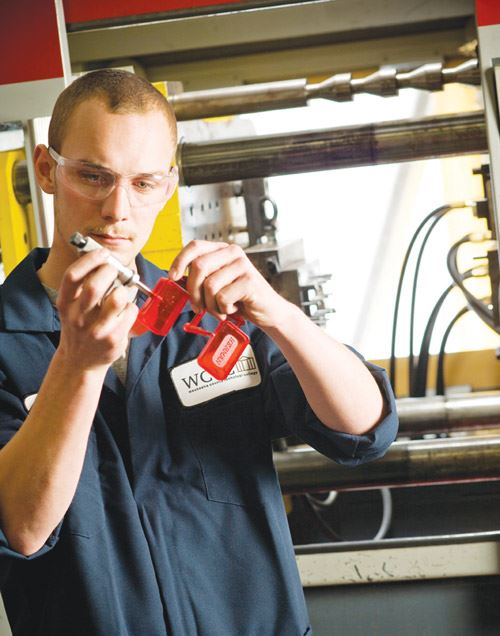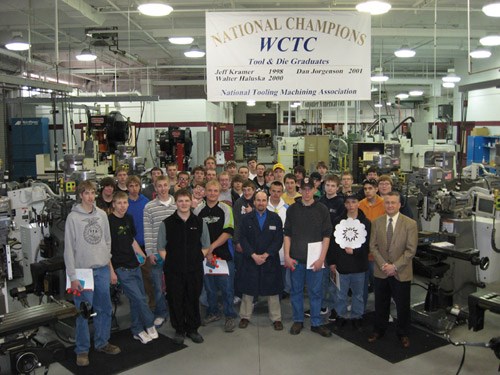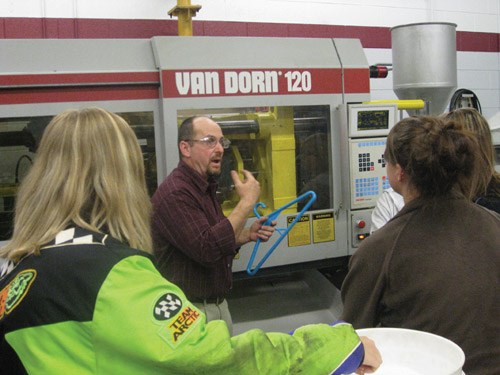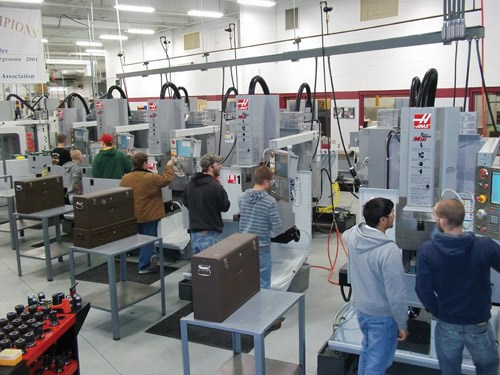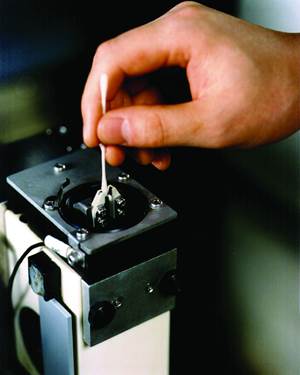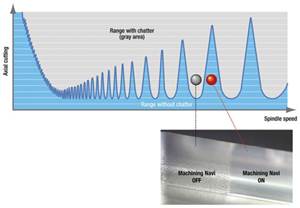Waukesha County Tech College: Industry Support Strengthens Curriculum
WCTC’s administration has always supported the tool and die program with the latest equipment and technology.
It’s no secret that this industry is facing challenging times with issues like the economy, foreign competition and attracting new talent. Fortunately, Waukesha County Technical College (WCTC; WI) is doing its part by offering a two-year technical diploma program that boasts modern equipment, knowledgeable instructors, and a successful employment rate.
According to WCTC instructor Robert Novak, the program was initially started as the result of local demand from employers. Funded by local property taxes, student tuition and state funding, the program has thrived during a time when other schools have experienced difficulty keeping their programs going. “We have embraced the new technologies, but continue to stress the fundamentals,” Novak says. “We know we are preparing the students for entry-level jobs. For example, if a student violates the strict attendance policy they are dropped from class.
“All of the program instructors are state-certified, journeymen tool and die makers from various areas of precision machining,” Novak continues. “We all have different strengths. Together, we make a great team and the students are exposed to a well-rounded education.”
Mike Shiels, Associate Dean, is in full agreement. “One of the things we have been blessed with in Waukesha County is that the moldmaking industry is very strong here,” he states. “That has been a huge benefit to our program. We have had tremendous industry support from great employers in this county. They come to us first when looking to hire new employees and they really value the graduates we provide them with. They are very flexible in working with student’s schedules. If they hire them when they are still a student, the student is able to finish their degree and then advance within the field. The employers have been great and supportive. They have been excellent at hiring our graduates.
“One of the keys to this program is Bob,” Shiels continues. “He is so engaged with the employers and receptive to their input. He works hand in glove with the employers to make sure the right students get with the right company and that is why they keep coming back to us.”
Program Specifics
WCTC’s Tool & Die program is a two-year technical diploma program. The first year is Machine Tool Operation and the second year focuses one semester on moldmaking and the other semester on diemaking. The students also receive instruction in various levels of CNC during both years in the program. “WCTC also provides the related classroom instruction for plastic injection set-up technician, machinist, and tool and die state indentured apprenticeship programs for the Bureau of Apprenticeship Standards,” Novak comments.
Novak points out that the program has enjoyed great success over the years. “Completion of the two-year program satisfies the state of Wisconsin classroom instruction requirements in an apprenticeship,” he explains. “This makes the program and students very popular with area employers. WCTC has two sections of first-year students with a total enrollment consistently between 36 and 40 students. The second year breaks down to one section with an enrollment of around 15.
“Most of the students that leave the program ‘job out,’” Novak continues. “They find jobs as machine operators, programmers or trainees. Some even show up in the apprenticeship classes. The students who complete the two-year program are just about guaranteed an apprenticeship in moldmaking, diemaking or some other area of precision machining. Most find part-time work in a shop during the two years they are taking classes; and these jobs typically lead to full-time work/apprenticeships.”
There are a large number of area employers who are almost always willing to hire a WCTC tool and die student, Novak adds. “The regional job requests for machining are typically in the hundreds; last year the total was 500,” he states. “Some years the requests have exceeded a thousand—with only 40 new students starting the program each year. Even during the leanest times the students find a surplus of job opportunities. The moldmaking shops are in competition with the diemaking, jig and fixture builders, special machine builders, CNC machine shops and other manufacturers to hire the 40 new students or the 15 graduating every year. Many employers hire the students in the first semester and work around the school schedule while they complete the program. In some cases, the employer will sign the student to an apprenticeship and send them to school one day a week for the remainder of the classroom instruction. In fact, the demand for WCTC students is so high that the college has not felt the need to implement a formal job placement program.”
Lee Ziebart, Vice President, Omega Tool (Menomonee Falls, WI ), has been hiring students from WCTC for approximately 25 years. “Probably one-third of our workforce have gone through this program,” Ziebart states. “The students turn into our employees—and many have been with us more than 20 years now. What is great about WCTC is that the students have a good grasp of the basics. They are invested in attending their classes and going to work. We have a much better success rate than we do with kids that come in off the streets.”
Novak is thrilled that the industry is involved in the school’s curriculum. “Area employers serve on the program’s advisory committee (see Advisory Committee Sidebar); and many local manufacturers have been very generous with donations of plastic, surplus steel, mold components, mold bases, technical advice, and an open-door policy for student tours,” he notes.
“Progressive continually looks for ways to support the industry, and in 2002 we established a program called Tooling for Tomorrow, through which both monetary and product donations are made to educational programs such as the one at Waukesha County Technical College,” notes Progressive Components Public Relations Coordinator Cynthia Kushtush. “It’s one way we can help ensure a viable future for both the industry and the young persons seeking to build their careers in it.”
Short- and Long-term Goals
According to Novak, the school’s short- and long-term goals revolve around marketing the program to area schools. “We’d like to increase enrollments/open sections in an attempt to close the huge gap between employer requests and students in the program,” he elaborates. “Another goal is to maintain a balance between teaching the basic skills necessary in the moldmaking field along with integrating cutting-edge software and technology so our graduates are able to manage and adapt to changing technology in the workplace.”
To that end, WCTC is updating both the moldmaking and diemaking curriculum. “Last year we completely revised the machine tool operation curriculum,” Novak recalls. “WCTC’s administration has always supported the tool and die program with the latest equipment and technology. For example, when it was determined it was time to start replacing the two-axis CNC mills in the tool and die lab, the administration budgeted for three-axis Haas toolroom mills. Between the school’s budget, Haas and the local Haas distributer, we were able to replace 10 machines with Haas toolroom mills. This year there are plans to replace five more machines. Partnerships with vendors, suppliers and manufacturers are critical in securing educational discounts to keep the costs of upgrades and new technology at a realistic level.”
Related Content
Maintaining a Wire EDM Machine
To achieve the ultimate capability and level of productivity from your wire EDM on a consistent, repeatable and reliable basis, regular maintenance is a required task.
Read MoreHow to Eliminate Chatter
Here are techniques commonly used to combat chatter and guidelines to establish a foundation for optimizing the moldmaking process.
Read MoreLine Width vs. Depth Ratio in Laser Engraving
A laser does not produce 90-degree sidewalls. It requires a certain amount of draft in order to produce the required pattern.
Read MoreHow to Achieve the Best Mold Finish
A look at factors that impact the polishability of tool steels and recommendations for obtaining a high-gloss finish.
Read MoreRead Next
Your Guide to Smarter, Faster Mold Design
Dive into expert-curated content delivering proven solutions for mold optimization, manufacturability and precision performance.
Read MoreHow to Use Continuing Education to Remain Competitive in Moldmaking
Continued training helps moldmakers make tooling decisions and properly use the latest cutting tool to efficiently machine high-quality molds.
Read MoreOvercoming Pain Points in Moldmaking with AI
Shops that embrace AI as a tool, not a threat, can enhance efficiency, preserve expertise, and attract tech-savvy talent.
Read More
